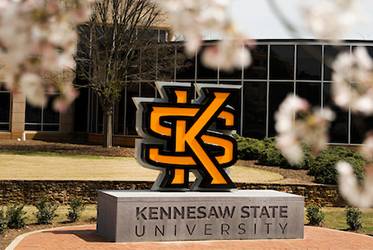
Economics Professor Ben Scafidi Speaks at the Inaugural Summit hosted by a New Think Tank Dedicated to Promoting Educational Opportunity, Criminal Justice Reform, and Entrepreneurship in "Fragile" Communities
KENNESAW, GA | Feb 14, 2018
Named, of course, for the famed and heroic Civil Rights attorney and first African American to serve on the US Supreme Court, the Thurgood Marshall College Fund is a national nonprofit organization that provides student scholarships and other support for public Historically Black Colleges and Universities (HBCUs). Less than a year ago, the Thurgood Marshall College Fund created a new think tank designed to support research at HBCUs. This new think tank is called the Center for Advancing Opportunity (CAO). The CAO will produce its own research and fund new research centers at HBCUs that are dedicated to studying ways to increase educational opportunity, promote criminal justice reform, and support entrepreneurship in what they refer to as “fragile” communities. The CAO defines “fragile” communities as ones where “residents — no matter their race or ethnicity — face significant barriers to opportunity. These communities are characterized by high crime, lack of quality educational options, and severely limited economic and social upward mobility opportunities.”

From left: Bob Maranto (University of Arkansas); Neal McCluskey (Cato Institute); Ben Scafidi (Kennesaw State University); James Shuls (University of Missouri-St. Louis); Albert Cheng (Harvard University); and Gerard Robinson (Center for Advancing Opportunity)
The CAO held its first event in Washington, DC on February 4-6, 2018. This Summit was attended by hundreds of faculty across many disciplines from HBCUs, representatives from many of the leading Washington, DC think tanks, and a variety of subject matter experts from around the nation.
At the Summit, CAO released its first annual survey of residents of fragile communities, which was conducted by the prestigious Gallup organization. This survey allowed the residents themselves to share their views of the problems in their communities and the current barriers that weigh against personal and community opportunity and success.
In addition, Summit attendees heard from two distinguished keynote speakers. The first keynote was given by Sir Angus Deaton, a Nobel Prize-winning economist and professor at Princeton University. Professor Deaton spoke about his recent and well-publicized research with Dr. Anne Case about the declining health status and life expectancy of Americans with lower levels of educational attainment.
The second keynote was given by Mr. Rich Dennis, an immigrant from Liberia who went on to found Sundial Brands, which manufactures beauty and personal care products for previously under served populations. Mr. Dennis explained his travails and eventual success as an entrepreneur and described his new endeavor in which he has established a $100 million venture capital fund to support entrepreneurial efforts of African American women. Once this venture capital fund becomes established, Mr. Dennis plans on creating a second $100 million venture capital fund dedicated to providing funding for African American men who are entrepreneurs. These funds will not only provide vital capital to start-up businesses, but they will also provide advice and support crucial for entrepreneurial success.
In addition to these two keynote addresses and the session describing the results of the survey of residents of fragile communities, the Summit featured individual sessions on promoting educational opportunity, criminal justice reform, and entrepreneurship. In the session on educational opportunity, Coles College of Business economics professor Ben Scafidi served as a panelist. Dr. Scafidi spoke about school funding issues and policies to promote educational opportunity. Before, during, and after his session, Dr. Scafidi enjoyed and learned immensely from the dialogue with HBCU faculty and other national experts.
The CAO is headed by Gerard Robinson, a former state school superintendent from both Virginia and Florida, and a coauthor of Dr. Scafidi’s.
This semester, Dr. Scafidi is working with CAO staff to refine their research methods and agenda. And moving forward, he looks forward to partnering with the CAO and with Centers at individual HBCUs to conduct research on understanding barriers and finding ways to improve educational opportunities in fragile communities.















